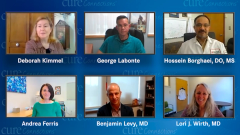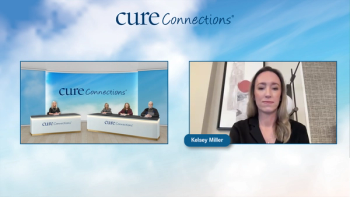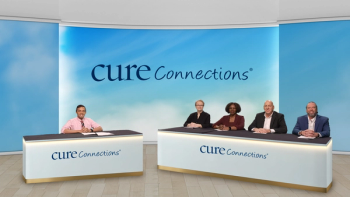
Molecular Testing and Novel Therapies for NSCLC
Benjamin Levy, MD, briefly describes the difference between driver mutations and immunotherapy biomarkers in non–small cell lung cancer and explains how decisions for immunotherapy or targeted therapy are made based on results of molecular assays.
Episodes in this series

Hossein Borghaei, DO, MS: In the world of lung cancer, we have all the driver mutations that we’ve talked about, and we have immunotherapy, which comes with its own biomarker. Let’s discuss briefly what’s a driver mutation, what’s a biomarker for immunotherapy, and what you do in your clinic when somebody walks in and says, “I don’t care what you say, give me my immunotherapy.”
Benjamin Levy, MD: That never happens. No, I’m joking—that happens all the time. It’s a complicated discussion. I have to tell patients, when they walk through the door, that we’re testing for DNA and genetic makeup of their tumor, which will drive a treatment decision with a potential targeted therapy, most likely a pill. But we’re also testing for protein levels on the surface of the tumor cell, and that protein is called PD-L1, which is a different test and may drive a treatment decision for immunotherapy, which comes mostly in the form of intravenous injections. This has become unique, so we’ve dichotomized a lot of lung cancer into the targeted therapies when we test for the DNA, such as pills, and immunotherapy when we test for protein expression on the surface of the cell.
What makes it so complicated is not every patient is going to respond to immunotherapy despite the direct-to-consumer advertising that’s going on out there. Andrea talked about level setting, and what we have to do when patients come to the door is to say, “You may not be the right candidate for immunotherapy, even if your PD-L1 protein is high,” which is the biomarker that truly defines the subset of patients that will derive a benefit from immunotherapy. In a very complicated way, we’re still trying to understand this. Patients with underlying genetic alterations in the DNA testing and RNA testing, and also with high protein levels, usually don’t do all that well with immunotherapy. In fact, they should really be treated with targeted therapy.
In our clinic we do both DNA and RNA genetic testing to make sure we’re defining the right patients for pills, targeted therapy, but at the same time we’re testing their protein level. As you know, the protein level comes back first—within 24 to 48 hours—and a PD-L1 of 80% or 90% would suggest that that patient may derive a benefit from immunotherapy. But we need to tell patients, “We need to wait, we need to wait for the genetic testing, because if you do have a genetic alteration of interest—one, you probably won’t respond to immunotherapy despite your PD-L1, and two, if we start with immunotherapy and then have to sequence you later to a targeted therapy, we may be in real trouble in terms of toxicity.” Andrea talked about level setting, and this is one of the things we have to do. Very savvy patients will come in and say, “I’ve already reviewed my PD-L1, I’m 80%, I’m ready for immunotherapy,” and we have to tell them we have to wait for the genetic testing to come back before we make that decision.
Andrea Ferris: Yeah, we actually have to do a lot of that education on our end as well afterward because, as you said, a lot of people want immunotherapy and think it’s the holy grail. But we have to explain to people in nonmedical terms, “If you do immunotherapy first, you may not be eligible for something that’s much more appropriate for you—and you might not be able to take it then, and that could have had better outcomes for you.”
Benjamin Levy, MD: There’s one more thing we’ve learned about over the last two years. These are relatively new data. At the beginning, when immunotherapy first came out in the KEYNOTE-024 data, which showed that Keytruda or immunotherapy is good for patients with high PD-L1, we really didn’t know that maybe we should be testing for genes first and really defaulting. My practice has shifted over the past 24 months. Three or four years ago we were still trying to learn, and we have good data suggesting—at least in the EGFR space, and maybe in the ALK space and others too—that immunotherapy, at least as a single-agent drug, is probably not the right choice for initial treatment for a patient with those genetic alterations.
Hossein Borghaei, DO, MS: I absolutely agree with that. That’s an important message to get across.
This transcript has been edited for clarity.


